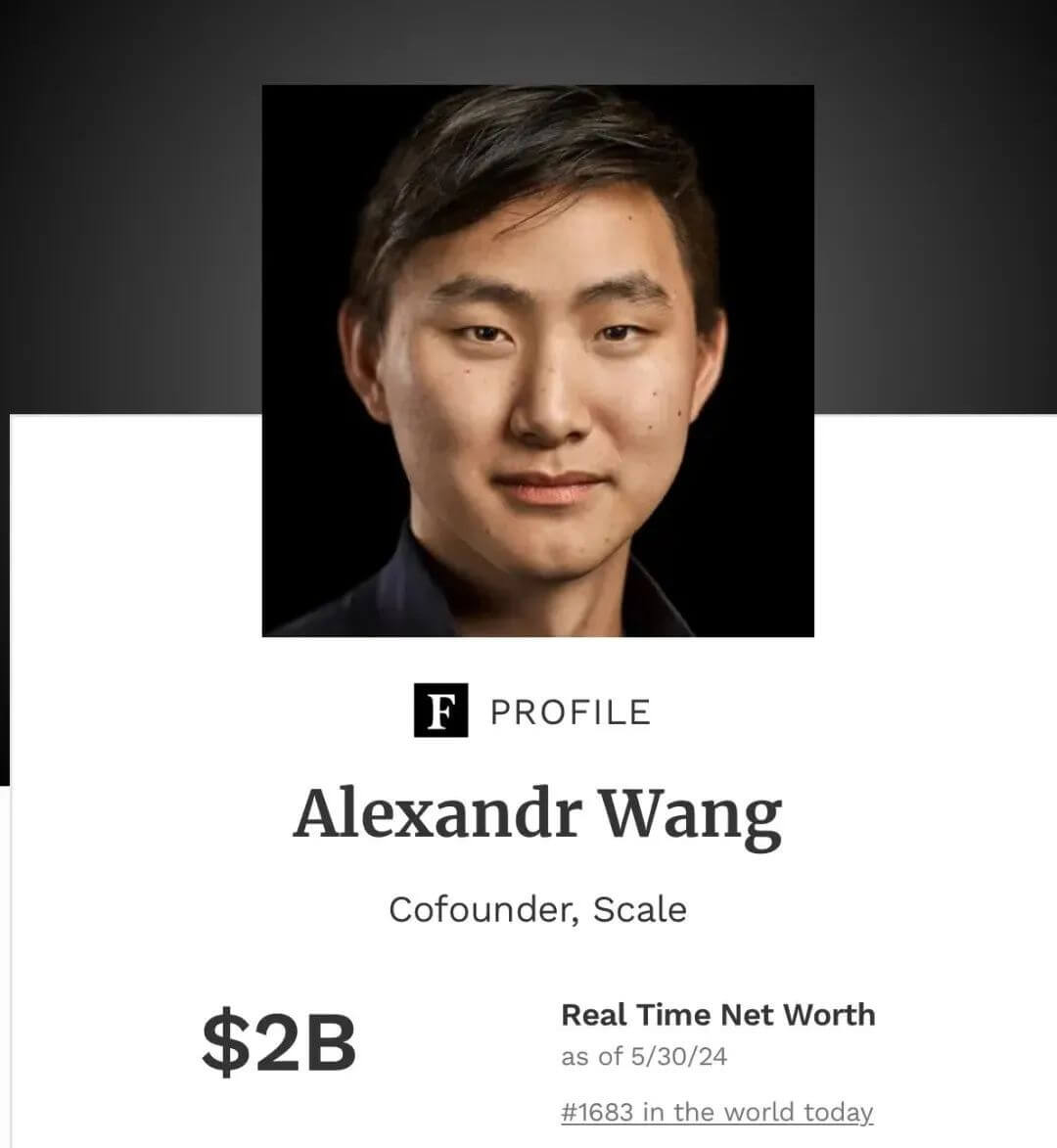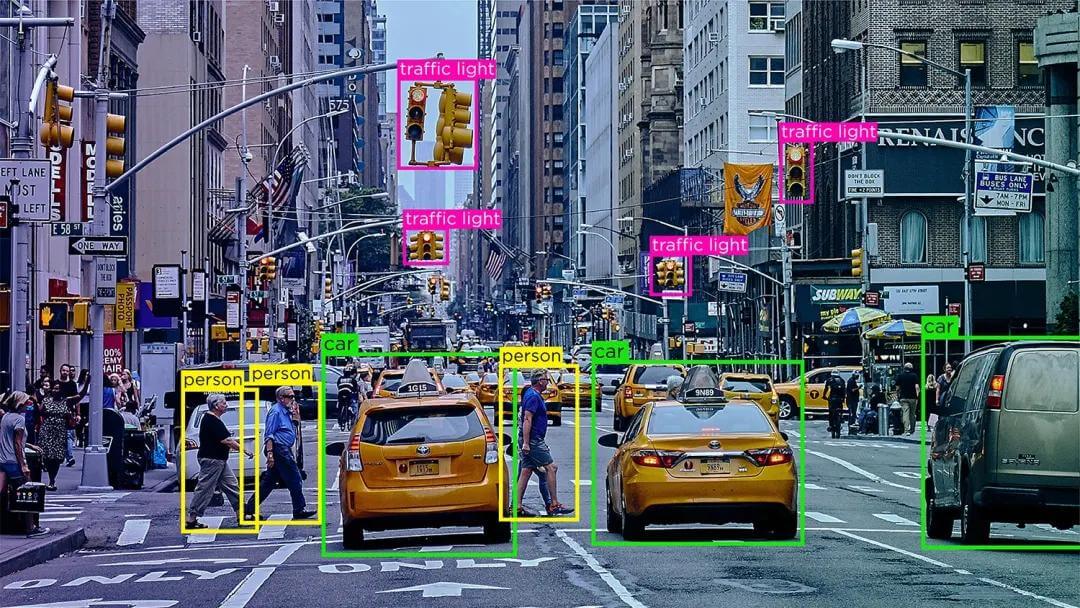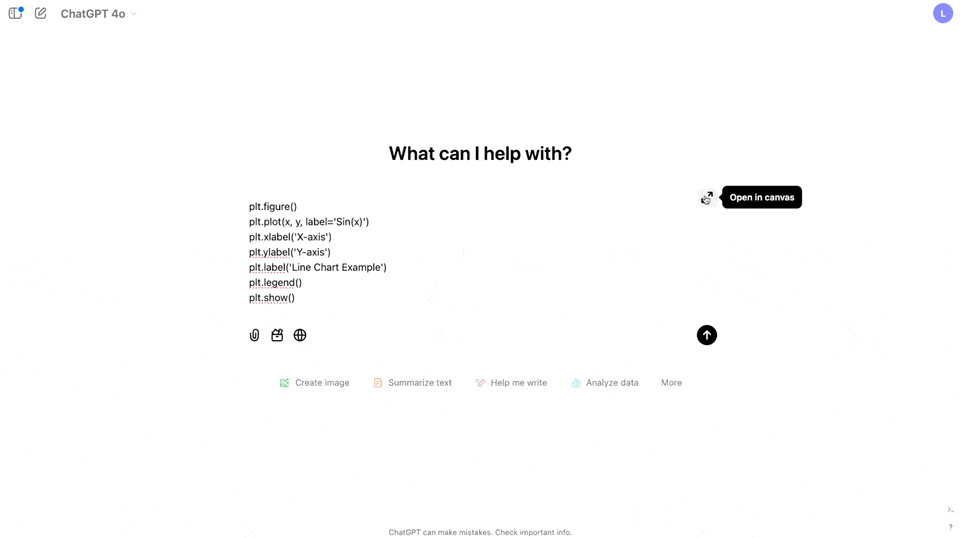Discover the inspiring journey of Alexandr Wang, the youngest self-made billionaire in history, and how his company, Scale AI, revolutionized the AI data labeling industry to become a $100 billion unicorn. Learn about his visionary leadership, the global trends that fueled Scale AI's growth, and why China hasn't yet produced a similar AI giant.
If we were to list the most powerful post-95 figures in the world today, one name would likely come up that most people have never heard of—Alexandr Wang.
This genius, often referred to as the "next Zuckerberg" in Silicon Valley, made his way to the Forbes Billionaires list in 2022 by riding the wave of generative AI, becoming the youngest self-made billionaire in history.
Although his company, Scale AI, saw its valuation drop significantly the following year, causing his name to disappear from the billionaire list, Alexandr Wang made a comeback in May this year when Scale AI raised $1 billion in funding, bringing its valuation to $13.8 billion (approximately ¥100 billion).
From founding Scale AI in 2016 to building a $100 billion unicorn company, Alexandr Wang and his company achieved this remarkable feat in just 8 years. Through Scale AI, Alexandr not only created a legendary startup story in the AI data labeling industry, but also played the role of a “shovel seller” in the global AI boom, providing data support for tech giants like Elon Musk, Ultraman, and Mark Zuckerberg, thereby shaping the landscape of the AI world in some ways.

1. The Genius Entrepreneur Who Sells Shovels
If we had to summarize Alexandr Wang’s entrepreneurial journey in one sentence, it would be: a protagonist who enters the scene with a "feel-good" success story.
Born in 1997 in New Mexico, USA, Alexandr’s parents were both physicists working at the Los Alamos National Laboratory.
There is an interesting story behind the origin of his name that draws on Chinese culture: The name "Alexandr" is a variation of the common English spelling, omitting one "e". In Chinese tradition, the number "8" is associated with good fortune, and his parents chose to give him a name with exactly 8 letters.
Growing up in a family of scholars, Alexandr quickly became the "model child" who excelled in academics.
As early as elementary school, Alexandr displayed his talent in mathematics. By middle school, he was attending the prestigious Los Alamos Academy, where he won several gold and bronze medals in U.S. mathematics competitions.
In high school, he self-taught programming and became a regular competitor in U.S. computing, physics, and math Olympiads, consistently ranking at the top.
By the age of 9, he had learned to play the violin and became proficient in multiple languages, including Chinese, English, and French, excelling in both the arts and sciences.
Not only was he academically gifted, but by high school, Alexandr had already received job offers from several tech companies in Silicon Valley. He first worked at Addepar, a prominent wealth management and big data platform, before joining Quora, an “overseas version of Zhihu”, where he worked as a coder and later became a technical lead.
It was at Quora that Alexandr met Lucy Guo, a fellow Chinese-American who would later co-found Scale AI with him.
In 2015, Alexandr was admitted to MIT, where he pursued degrees in mathematics and computer science. According to his LinkedIn profile, he had a perfect GPA of 5.0 (out of 5.0), and he even took graduate-level computer science courses during his undergraduate years.
It was during his freshman year at MIT that AlphaGo, developed by DeepMind, defeated the world champion in the game of Go, marking the beginning of the AI era and the deep learning boom.
"I remember being in college and trying to use neural networks to train image recognition models. I quickly realized that these models were largely just products of data," Alexandr recalled in a later interview. "These models, or AI systems in general, are built on three fundamental pillars—algorithms, computational power, and data."
At that time, companies like OpenAI or Google’s labs were already researching algorithms, and Nvidia had established itself as a leader in providing computational power for these AI systems.
However, no one was focusing on data. Alexandr recognized that, as AI technology continued to evolve, data intelligence would become increasingly important.
So, after his freshman year at MIT, during the summer break, Alexandr decided to drop out of MIT. Lucy Guo, too, dropped out of Carnegie Mellon University. Together, they co-founded Scale AI.
Many people felt regretful about their decision to drop out, seeing it as a risky move, but Alexandr’s perspective was different: "If we’re not willing to take this step now, when will we?"
There’s an amusing anecdote from this period:
One summer day, after his freshman year ended, Alexandr told his parents he had started a project over the summer.
When his parents asked him what kind of project it was, he jokingly responded, “Something like selling lemonade or food delivery?”
Alexandr replied, “It’s more or less that, but I started an AI company, and someone named Sam Altman invested some money into it. By the way, he also invested in Airbnb, which is now valued at over $30 billion.”
In addition to securing angel funding from Y Combinator (where Sam Altman was the president at the time), Scale AI also secured Series A funding from venture capital giant Accel in its first year. With this support, Scale AI overcame initial financial hurdles.
From the very beginning, Alexandr envisioned Scale AI as a one-stop service center to solve the data challenges in the AI ecosystem.
As a result, Scale AI’s early focus was to create a highly efficient and accurate data labeling platform by combining automation technology with human review, enabling companies to quickly process and label large datasets to train machine learning algorithms.
Data labeling refers to the process of adding structured information to raw data, such as images, text, video, or audio, so that machine learning models can understand and learn from it.
Simply put, it’s like taking a video or image and categorizing elements like pedestrians, vehicles, buildings, etc. This is something that even elementary school students could do, in a certain sense.

Although the concept is simple, the data that has been labeled is indispensable for the development of artificial intelligence. AI models require a large amount of labeled data to learn and gain functions such as recognition, classification, and prediction.
It’s worth mentioning that while some automation tools can speed up parts of the labeling process, high-quality and highly accurate labeled data still require significant human involvement in processing, tagging, and verifying the data, especially in fields like healthcare, autonomous driving, and military applications, where high precision is crucial.
In fact, before Scale AI’s rise, the data labeling industry in AI had long been at the "marginal" position, with its demand for a large workforce leading many to label it as a labor-intensive industry.
Most people saw the data labeling industry as neither "AI" nor remotely "sexy."
But it was this "low-barrier" and "hard work" sector that Alexandr Wang turned into a $100 billion AI unicorn in just 8 years. In 2023, he was listed among the 100 most influential figures in AI by Time magazine, alongside Li Feifei, Jensen Huang, and Robin Li. Alexandr was one of the youngest individuals on that list.
So, how did Alexandr lead Scale AI to achieve this success?
2. From Zero to $100 Billion Valuation: What Did Scale AI Do Right in 8 Years?
Although data labeling may appear to be a low-barrier, labor-intensive industry, in 2016, it was one of the few untapped markets.
Apart from a few big companies like Google and Amazon, which had their own data labeling departments due to business needs, most companies were unwilling or lacked the resources to manage this themselves, making the process of acquiring labeled data time-consuming and expensive.
This gap in the market provided Scale AI with an opportunity to "sell the shovel," and looking back at the 8-year development of Scale AI, its success can be seen as a combination of timing, location, and the right people.
-
Timing
After founding Scale AI, Alexandr and his team capitalized on several key trends in the AI industry over the course of 8 years.
First, there was the autonomous driving sector.
2016 was the first year of the AI era and also the starting point for the autonomous driving cycle, when Cruise was acquired by General Motors for over $1 billion.
Upon learning about this, Alexandr realized that the autonomous driving industry would generate a massive demand for data labeling. Autonomous driving technology relies on large amounts of high-precision labeled data, such as images of road scenes, pedestrians, and other objects. Car companies need thousands of hours of video data for labeling to train and validate their algorithms.
"We built the first data engine that supports sensor fusion data, combining 2D and 3D data, such as LiDAR and cameras, installed on vehicles. This quickly became the industry standard."
By establishing an efficient data labeling platform and using model-assisted labeling and data preprocessing to speed up the data processing workflow, Scale AI was able to reduce labeling costs and time significantly, which led to partnerships with automakers like GM, Toyota, and Waymo.
This enabled Alexandr and Scale AI to solidify their foothold in the autonomous driving data labeling field.
During 2019–2020, when the autonomous driving industry had largely matured and language models and generative AI had yet to emerge, AI as a whole was in a period of high uncertainty.
At this point, Alexandr and Scale AI shifted their focus to government applications. "This is an area with obvious high applicability, and it is becoming increasingly important globally."
It was through this expansion into new markets that Scale AI transitioned from a pure data labeling company to a comprehensive data service provider, offering end-to-end solutions from data labeling and management to model training and evaluation, as well as AI application development and deployment.
In the following years, Scale AI rose rapidly in the data field, and its client base expanded into sectors like healthcare, defense, e-commerce, and government services.
Additionally, to address challenges related to insufficient data in certain industries, Scale AI also extended into synthetic data generation, helping to train models by creating new datasets from existing data.
During this time, Scale AI also began focusing on generative AI and partnered with OpenAI to conduct the first RLHF experiments on GPT-2.
"At the time, the models were very rough and didn’t look great. But we thought OpenAI was a group of smart people, and we should work with them. So, we collaborated with the team that invented RLHF and started innovating from 2019 onwards."
In 2022, the release of ChatGPT shocked the world, sparking a generative AI boom—generative AI models require massive amounts of training data to improve the accuracy and diversity of their generated content. The explosive growth of large language models further fueled the demand for high-quality labeled data across the industry.
By partnering with OpenAI, Scale AI gained a first-mover advantage in the generative AI space. Today, Scale AI has become a data powerhouse for general AI, supporting nearly all of the major large language models from companies like OpenAI, Meta, and Microsoft.
-
Location Advantage
In addition to seizing these industry trends, Alexandr also took advantage of globalization to minimize costs in the data labeling industry.
Given the high labor costs in the U.S., where part-time data labeling jobs on platforms like LinkedIn and Indeed often pay between $30 and $200 per hour, businesses in this labor-intensive sector are naturally compelled to consider solutions for data production or outsourcing such services.
In 2017, Scale AI established Remotasks as its internal outsourcing agency, setting up dozens of offices in countries such as Kenya, the Philippines, and Venezuela. They trained thousands of data labelers around the world, most of whom worked on a per-piece compensation basis, earning as little as a few cents per task, with many contractors earning less than $1 per hour.
Some industry experts pointed out, "Scale AI is not an AI startup; it’s just a company providing cheap labor."
Despite the criticism, it’s undeniable that, under this "global factory" model, Scale AI's gross margin has consistently exceeded 65%, making it one of the few AI startups that doesn't burn money but instead makes a fortune.
In 2023, Scale AI’s annual revenue reached $750 million (about ¥5.43 billion), and it is projected to reach $1.4 billion (about ¥10.1 billion) by the end of 2024.
-
The Right People
In addition to rapid revenue growth, Alexandr and Scale AI have assembled an impressive group of investors over the past 8 years. The company has not only attracted a large number of Silicon Valley heavyweights but also super-tech companies such as Amazon, Nvidia, Intel, and Meta.
As mentioned earlier, Scale AI received support from the famous Silicon Valley incubator Y Combinator and venture capital giant Accel in its early days. Sam Altman, then president of Y Combinator, later collaborated with Scale AI through OpenAI. Partners from Accel even lent Scale AI their basement for temporary office space.
In the following 5 to 6 years, Scale AI raised funding almost every 1-2 years, with investors offering more than just financial support, helping in many other aspects of the business.
In May 2024, Scale AI announced it had completed its Series F funding round, raising $1 billion, pushing its valuation up by over 80% to about $13.8 billion (around ¥100 billion). The investor lineup was nothing short of epic, with over 20 institutions and individuals, including old investors like Accel, Index Ventures, Founders Fund, Coatue, Thrive Capital, and others such as Nvidia, Amazon, Meta, Cisco, Intel, AMD, DFJ Growth, WCM, ServiceNow Ventures, and former GitHub CEO Nat Friedman.
As the saying goes, "When the time is right, the whole world helps." Undoubtedly, as one of the "shining stars" of this AI wave, Alexandr and Scale AI are set to leave an indelible mark on the industry.
As Alexandr said in an interview after completing the Series F round: "Scale AI provides data support for almost all leading AI models in today's market. With this funding, the company will enter the next phase of its journey—accelerating the enrichment of cutting-edge data to pave the way for general artificial intelligence."
Solving the data problems of artificial intelligence will be his lifelong mission.
3. Why Hasn’t Scale AI Emerged in China?
In fact, after reading the story of Scale AI's development, a common question that might arise is: why hasn't a similar company like Scale AI emerged in China?
Especially before the surge of generative AI, China's AI industry was once ahead in terms of applications, and data annotation, being a labor-intensive business, inherently provided China with an advantage. So, why is this the case?
There are several reasons behind this:
-
"Resource Trap"
Here, let's introduce the concept of a "resource trap (curse)." What is a resource trap? It refers to a situation where a country or region has abundant natural resources but becomes overly dependent on them, neglecting other potential areas for economic growth, such as manufacturing, services, and technological innovation. This results in a one-dimensional, unbalanced economic structure, and when these natural resources deplete or market demand drops, the economy can suffer severe setbacks.
Typical examples of such countries are Venezuela and Russia, which rely heavily on oil, natural gas, and other resources to earn foreign exchange. However, apart from the energy sector, other industries are underdeveloped. These countries are often referred to as "resource curse" countries.
To some extent, China's AI data annotation industry has also fallen into a similar "curse" of resource abundance.
In fact, data annotation business in China started developing quite early, but it has not yet scaled up. Many leading enterprises set up data annotation departments, but these departments mostly serve their own business needs rather than seeking to match data with various industries.
Moreover, the advantage of China's population dividend has made the cost of obtaining annotated data incredibly low. Even today, data annotation prices in China remain relatively cheap, with cities like Chongqing (a new first-tier city) offering salaries ranging from 4,000 to 6,000 RMB/month.
In such a situation, using technological platforms or further developing innovations to enhance data annotation, or even extending from the annotation industry to further innovation, might seem unworthy for companies engaged in market competition.
However, if a company misses the opportunity for technological innovation or accumulation in the data annotation industry at this stage, it might forever miss the chance for future innovation and upgrades.
-
Lack of Ecosystem
The lack of ecosystem is reflected in two aspects. First, from the language ecosystem standpoint, it must be acknowledged that the global reach of the English language is far wider than that of Chinese, which is primarily used in China and among overseas Chinese communities.
As a result, Scale AI naturally has an advantage in the data annotation industry, standing on a high capital ground, seeking value opportunities worldwide, while China, despite its population dividend, ultimately faces higher cost advantages and lacks a dominant position in capital (investment and financing).
Additionally, it is important to note that a few years ago, as the mobile internet landscape matured, China's internet ecosystem further moved toward anti-closure. This caused obstacles to the flow of data, and the data annotation industry was inevitably forced to participate in this anti-closure ecosystem, each fighting for its own interests, preventing the formation of an effective, large-scale innovative force.
-
Limited Vision
For the data annotation industry, at the time, only a few people were able to see its potential because they believed in it.
Abroad, there were only a handful of people, like Alexandr Wang, who could see it, and in China, such people were even fewer.
In fact, most people involved in the data annotation industry followed the traditional logic of labor-intensive industries, relying on "involution" to achieve survival and profits.
However, what set Alexandr Wang apart was that, despite the labor-intensive nature of the industry, for him, this was just the most basic part of the process. It served as a stepping stone to building the entire upstream and downstream ecosystem of the data industry. As he mentioned in a recent interview, people have exhausted all the data available on the internet. To develop an AI stronger than GPT-4.5, it is necessary to build cutting-edge data.
The so-called "cutting-edge data" refers to data closely related to application scenarios that can reflect the latest trends and changes in real-time. It often contains many long-tail or rare scenarios, helping to improve AI's performance in atypical situations and pushing the boundaries of AI capabilities toward complex reasoning and multi-modal applications.
As AI evolves rapidly, future data training will need to be more closely aligned with specific tasks and application scenarios. Thus, there will be a need to excavate and produce more new, differentiated data, and this might be the future Alexandr Wang foresaw back in 2016.
From this perspective, Scale AI, as a mirror, has much to teach us about how it grew from the "cheapest" industry into a hundred-billion-dollar AI unicorn.







